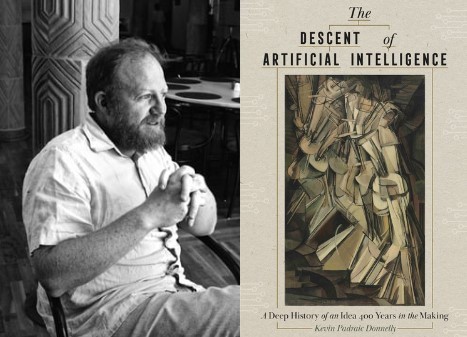"What is the 'Human Level'? A Deep Dive into the Ideas that Shaped Modern AI" with Kevin Donnelly
Franklin Hall 427 Chestnut St Philadelphia, PA 19106
In-person registration for this event is now closed. The stream for this event can be view on our YouTube channel.
Wednesday, December 18, 2024
12:00 - 1:00 p.m. ET

Join us for a Lunch at the Library presentation from Kevin Donnelly, who will be discussing his new book: The Descent of Artificial Intelligence: A Deep History of an Idea 400 Years in the Making (University of Pittsburgh Press).
This event will take place on Wednesday, December 18, 2024 at 12:00 p.m. ET in Benjamin Franklin Hall and will also be livestreamed. This event is free to attend but registration is required.
In person registration for this event is now closed.
This event is part of the programming of the APS's Center for the History of Science, which encourages greater engagement with the Library & Museum's deep and extensive holdings in this field. Learn more about the Center for the History of Science here.
What is the “Human Level”? A Deep Dive into the Ideas that Shaped Modern AI
The idea that a new technology could challenge human intelligence is as old as the warnings from Socrates and Plato that written language eroded memory, and with the emergence of generative artificial intelligence programs, we find ourselves once again debating how a new technology might influence human thought and behavior.
Researchers, tech barons, and “visionary” writers even imagine an AI that will equal or surpass human intelligence, adding to a sense of technological determinism where humanity is inexorably shaped by powerful new machines. But among the hundreds of essays, books, and movies that approach the question of whether AI can transcend the “human level,” few have asked, let alone answered, a simple question that has vexed scientists and philosophers for centuries: what, exactly, is the “human level”?
Rather than focusing on technical contributions in machine building, The Descent of Artificial Intelligence explores a more diverse cast of thinkers who helped to imagine the very kind of human being that might be challenged by a machine. In a striking challenge to the conventional narrative of AI, Kevin Padraic Donnelly argues that what we often think of as the “goal” of AI has in fact been shaped by forgotten and discredited theories about people and human nature as much as it has been by scientific discoveries, mathematical advances, and novel technologies. By looking at the development of AI through the lens of social thought, Donnelly deflates the image of artificial intelligence as a technological monolith and reminds readers that we can control the narratives about ourselves.
